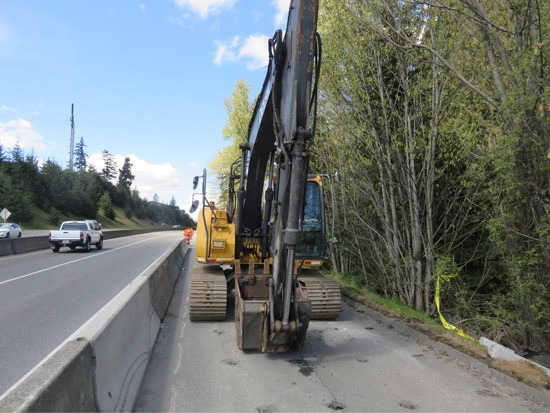A wrongful death suit has been filed in the Pierce County Superior Court in the state Route 410 construction project in Bonney Lake that led to the deaths of Josh, Vanessa and Hudson Ellis (click here for more information).
The wrongful death suit was filed on Aug. 27, four months after the family was killed by a falling concrete barrier on Angeline Road, and it brings to court all the parties involved in the project.
This includes construction companies WHH Nisqually Federal Services, Highmark Concrete Contractors, Staton Companies and Hamilton Construction/American Concrete Cutting, whose names have been at the forefront of several investigations since April.
McGee Engineering, a construction company that was not fined by Labor and Industries, and the city of Bonney Lake are also defendants in the wrongful death suit.
The plaintiffs in the suit are Zach Brown, the court appointed representative of the estates of the family and brother to Vanessa Ellis, and Diane Hess who is the mother of Vanessa. The plaintiffs are filing for damages against all parties involved in the construction project.
Highmark is the only company to answer the suit so far, which it did Sept. 22. In its answer, Highmark denied that each defendant involved in the SR 410 project is responsible for the death of the Ellis family, and specifically denies the company was negligent or that it caused injury.
Staton, Hamilton, WHH Nisqually, McGee and the city of Bonney Lake have declined to comment on the suit.
The Pierce County Prosecutor’s Office has not released a decision concerning any criminal prosecution in the case.
In October the state Department of Labor and Industries levied fines against four of the five construction companies involved in the project. (Click here for more information)
What is a wrongful death suit?
There are two kind of suits in cases like this, according to Kevin Sullivan, the attorney who represents the plaintiffs in this case.
The first type of claim is a wrongful death suit.
“That is for the losses suffered by the survivors of the decedent (dead person),” Sullivan said. “The entire immediate family was killed in the accident. In the statute, those would be what you would call ‘first tier beneficiaries.’ Next level beneficiaries are parents of the deceased.”
According to Sullivan, parents of adult decedents can only collect damages if they can prove to the court they were financially dependent on the deceased.
The only surviving family member that meets these requirements is Hess, who starting living with her daughter and Josh in 2013, rent-free.
Beginning in 2014, when the family bought a home in Bonney Lake, Hess started paying $500 in rent and the family paid all other house expenses, according to Hess’ declaration.
Currently, Hess is living with Brown and his wife, and wrote in her declaration that she still cannot financially support herself.
In addition to wrongful death suits, families of the deceased can also claim damages under the survival statute, no matter their financial status.
“Under the statutes, (this covers) the funeral expenses, their pre-death conscious pain and suffering, and the net-loss accumulations to their estate,” Sullivan said.
According to Sullivan, funeral expenses were minimal because they were picked up by the Ellis’ church, Eastpointe Foursquare Church.
Additionally, there are no pre-death conscious pain and suffering costs, because the Ellis family died instantly when the concrete barrier fell on top of their truck’s cab.
This only leaves the value of the Ellis’ estates in question. Josh, Vanessa and Hudson each have their own, but related, estate.
“What is the value of their estates? That’s a battle between different experts,” said Sullivan. “Work-life expectancy is one variable. The second is the discount rate that is applied to the income stream. The third is the personal accumulation rate of the individual decedent. All of those are in controversy, which they normally are.”
Sullivan declined discussing the specific monetary amounts the plaintiffs are looking for, but said, “The family trusts that the jury will do the right thing.”
The trial is currently set for Aug. 25, 2016 in the courtroom of Pierce County Judge Ronald Culpepper.


